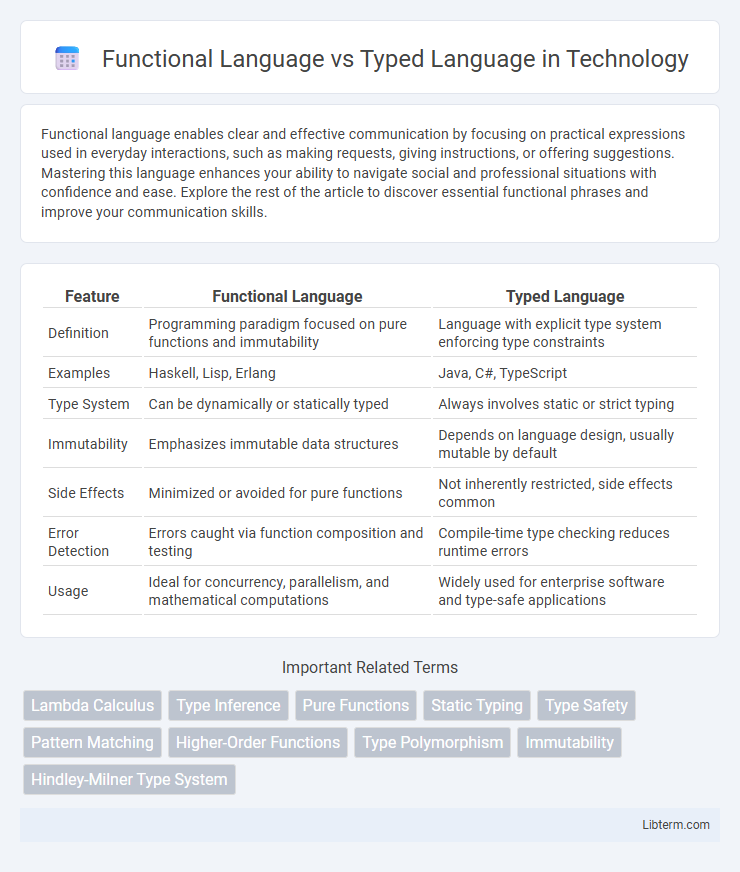Functional language enables clear and effective communication by focusing on practical expressions used in everyday interactions, such as making requests, giving instructions, or offering suggestions. Mastering this language enhances your ability to navigate social and professional situations with confidence and ease. Explore the rest of the article to discover essential functional phrases and improve your communication skills.
Table of Comparison
| Feature | Functional Language | Typed Language |
|---|---|---|
| Definition | Programming paradigm focused on pure functions and immutability | Language with explicit type system enforcing type constraints |
| Examples | Haskell, Lisp, Erlang | Java, C#, TypeScript |
| Type System | Can be dynamically or statically typed | Always involves static or strict typing |
| Immutability | Emphasizes immutable data structures | Depends on language design, usually mutable by default |
| Side Effects | Minimized or avoided for pure functions | Not inherently restricted, side effects common |
| Error Detection | Errors caught via function composition and testing | Compile-time type checking reduces runtime errors |
| Usage | Ideal for concurrency, parallelism, and mathematical computations | Widely used for enterprise software and type-safe applications |
Introduction to Functional and Typed Languages
Functional languages emphasize immutability and first-class functions, enabling concise and predictable code through pure function composition. Typed languages enforce a strict type system that checks data types at compile time, reducing runtime errors and improving code safety. Combining functional programming with strong typing, languages like Haskell and OCaml offer powerful abstractions and robust error detection for complex software development.
Defining Functional Programming Languages
Functional programming languages emphasize the use of pure functions, immutability, and first-class functions to promote declarative code and avoid side effects. Typed languages incorporate static type systems that enforce type constraints at compile time, reducing runtime errors and enhancing code reliability. Functional languages like Haskell and OCaml often integrate strong typing to combine functional paradigms with robust type safety.
What Are Typed Languages?
Typed languages enforce explicit data types for variables and expressions, enhancing code reliability and reducing runtime errors through compile-time type checking. These languages include static types, such as in Java, C++, and Haskell, which catch type mismatches before execution. Typed languages improve maintainability by enabling clearer contracts within the code, facilitating better tooling support like autocompletion and refactoring.
Key Differences Between Functional and Typed Languages
Functional languages emphasize immutability, first-class functions, and declarative programming styles, promoting concise and predictable code. Typed languages enforce data type constraints at compile-time or runtime, enhancing reliability and reducing errors through static or dynamic type checking. While functional languages can be either typed or untyped, typed languages focus primarily on type safety and verification, regardless of the programming paradigm.
Type Systems in Functional Languages
Functional languages leverage sophisticated type systems like Hindley-Milner and dependent types to enforce strong static typing, enabling early error detection and code correctness. These type systems support polymorphism, type inference, and type safety, promoting concise and expressive code while reducing runtime failures. The rigorous type discipline in typed functional languages enhances maintainability and facilitates formal verification of program properties.
Benefits of Functional Programming
Functional programming enhances code modularity and reusability by treating functions as first-class citizens and emphasizing immutability. It reduces side effects and state mutations, leading to more predictable, easier-to-debug programs that improve maintainability and reliability. These benefits often result in optimized performance and scalability, especially in concurrent and parallel computing environments.
Advantages of Typed Languages
Typed languages offer strong type checking that reduces runtime errors by detecting type mismatches during compilation, enhancing code reliability and maintainability. They improve developer productivity through advanced tooling support such as autocompletion, refactoring, and debugging, which rely on precise type information. Enhanced readability and clearer documentation result from explicit type annotations, facilitating collaboration and long-term codebase scalability.
Practical Examples: Functional vs Typed Syntax
Functional languages like Haskell emphasize pure functions and immutable data, using concise syntax such as `map (\x -> x * 2) [1,2,3]` to apply transformations without side effects. Typed languages, including Scala and Rust, combine type safety with practical syntax, for example, Scala's `val doubled: List[Int] = List(1, 2, 3).map(_ * 2)` enforces types at compile-time while allowing functional operations. The syntax differences reflect the paradigm focus: functional languages prioritize function composition and immutability, whereas typed languages balance strict type-checking with flexible coding styles.
Use Cases and Industry Applications
Functional languages excel in data analysis, artificial intelligence, and concurrent systems due to their emphasis on immutability and pure functions, which reduce side effects and enhance parallel processing. Typed languages, such as Java and C#, are widely adopted in large-scale enterprise applications, financial systems, and safety-critical software, where static type checking ensures code reliability and maintainability. Industries like finance, healthcare, and aerospace benefit from typed languages for error prevention, while tech startups and research institutions leverage functional languages for rapid prototyping and complex algorithm development.
Choosing the Right Language for Your Project
Choosing the right language for your project depends on factors like type safety, performance needs, and code maintainability. Typed languages such as Rust or TypeScript enforce strict type checking, reducing runtime errors and enhancing code reliability. Functional languages like Haskell or Elixir prioritize immutability and pure functions, improving concurrency support and making complex data transformations easier to manage.
Functional Language Infographic

 libterm.com
libterm.com